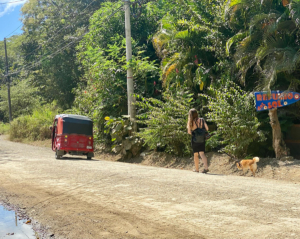SOU student receives prestigious scholarship
(Ashland, Ore.) — Chloe Fiveash, a Southern Oregon University junior majoring in biochemistry, is one of 438 recipients nationwide of the 2024 Goldwater Scholarship – a prestigious U.S. award that recognizes the research work of undergraduates in math, science and engineering. Fiveash, a first-generation college student who experienced homelessness while in high school, is SOU’s first Goldwater Scholar since 2021 and second since 2007.
Goldwater Scholars each receive as much as $7,500 annually for tuition, fees and room-and-board, along with national recognition for their undergraduate research. Fiveash is also a McNair Scholar at SOU and receives federal Pell and Supplemental Education Opportunity grants, the Oregon Opportunity Grant and at least five other scholarships.
She completed a 2022 independent internship by researching the ability of the insecticide fipronil to be absorbed by field mustard, to determine if the plant can effectively reduce concentrations and toxic effects of fipronil. She is currently researching the ability of the mold Aspergillus niger to limit the toxicity of glutamate, a neurotransmitter that is common in many foods.
“I feel incredibly honored to be recognized for my dedication to my research and education,” Fiveash said. “This opportunity will allow me to focus on the more impactful aspects of my current education such as my classes and research projects, and it will also open many doors for future financial endeavors to support my desire to go to graduate school.”
Fiveash has served as a volunteer caregiver at Mountain View Adult Foster Home, worked with SOU’s OSPIRG group to help with voter registration and volunteered to clean up the Antioch Cemetery. She is a member of the National Society of Collegiate Scholars, has made the Provost’s List of full-time students earning at least a 3.5 grade point average several times and is on track to graduate cum laude in June 2025
She is one of just four Oregon university students to be selected as Goldwater Scholars this year. A total of 1,353 science, engineering and mathematics students were nominated by 446 academic institutions to compete for the 2024 Goldwater Scholarships. The 438 scholarships awarded for 2024 brings the total number since 1989 to 10,720. Almost all of this year’s awardees – including Fiveash – intend to pursue doctorate degrees, with 57 of them planning research careers in mathematics and computer science, 237 in the sciences, 80 in medicine and 64 in engineering and materials research.
“I am so grateful for Chloe,” said Vincent Smith, director of SOU’s School of Science & Business. “Her hard work, determination and perseverance are inspirational.
“We face so many challenges as a planet,” Smith said. “I strongly believe that education still remains the greatest path toward equality, sustainability and vitality. SOU is appreciative of the Barry Goldwater Scholarship and Excellence in Education Foundation for their commitment to recognizing remarkable human potential.”
The Barry Goldwater Scholarship and Excellence in Education Foundation is a federally endowed agency that was created in 1986. Its scholarship program “was designed to foster and encourage outstanding students to pursue research careers in the fields of the natural sciences, engineering and mathematics,” according to its website. “The Goldwater Scholarship is the premier undergraduate award of its type in these fields.”
The application process for the Goldwater Scholarships prompts students to demonstrate their commitment to research and tighten their focus on career goals – skills they will need when applying to graduate schools and for subsequent research scholarships. SOU undergraduates interested in learning more about the Goldwater Scholarship, eligibility criteria and how to apply may contact Melissa LaBonty, assistant professor of biology and the Goldwater Scholarship campus representative, at labontym@sou.edu.
-SOU-



 The trip is being coordinated through SOU’s
The trip is being coordinated through SOU’s 






